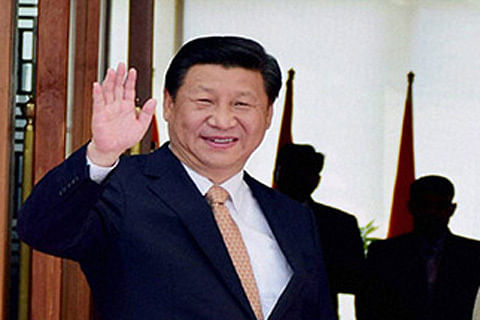Chinese President Xi Jinping has barged into unprecedented third term in office with a complete control over Communist Party of China. That he would be continuing president of China was known much before the critical 20th Congress of CPC took off in Beijing last week. For China, it means continuity. Xi Jinping’s third term and his tight grip over the party has ramifications for the world, as at the moment there are only two superpowers – the United States of America and China.
India is creating its own space in the world in between these two superpowers. It is a strategic partner of the US. The two countries have crossed many milestones ever since the nuclear deal was signed in 2005. There has been a lot of progress in their relations. China, is a neighbour, with which India has had sweet-sour relations. The two countries are Asian giants. Both compliment each other and they can build Asian century together by walking in lockstep with each other. But, China by inflicting a tense military standoff in eastern Ladakh has soured the relations. These unfortunate developments that took place during Xi Jinping’s second term cannot be erased from the history.
Now India will have to look at the fresh term of Xi from three angles. One, its own relationship with Washington, as it cannot escape the tag of being an ally of the US. This alliance is seen by the world as Washington’s move to use India to counter balance China’s influence in the region. This is the world view which India finds it difficult to remove despite it having spurned all elements of the carrot and stock policy that the West, and US, in particular, sought to use in the aftermath of Russian invasion of Ukraine. India continued with its import of the Russian oil and weaponry, symbolising its independent foreign policy and national interest above all other considerations. This, in itself, was a message to the world, that the country of India’s size, population, and potential, cannot be taken for granted. Washington got the message, so did the rest of the west that thought that India could be bullied into adopting anti-Russia line. India, not only resisted that, but also declared it unequivocally that it would watch its national interest first. At the same time, what needs to be looked at is that how will India play its role in evolving Chia – US relations. There comes the catch. If it knows its strengths, there are vulnerabilities too.
Second, there is iron clad relationship between China and Pakistan. Beijing has larger strategic interests in Pakistan than China- Pakistan Economic Corridor, the pilot project of China’s all-time ambitious project, influencing continents and driving their politics and economy through its Belt and Road Initiative. Pakistan’s strategic location serves China’s interests in reaching to Central Asia and enhancing its influence in South Asia and Central Asian regions .
India is facing China-Pakistan alliance pressure in all spheres. Recently China has shielded Pakistan at the international level. It stood like a rock in defence of Pakistan in blocking designation of Pakistan-based terrorists as global terrorists. The resolutions sponsored by India and the US could not sail through only because China intervened and blocked the whole process. This has two contexts – one, China is doing what it could do, in fact it has done so at the risk of its own reputation of countering terrorism. Secondly, these moves helped Pakistan exit FATF’s grey list. That’s a big relief for Islamabad. In both the cases, China has worked in favour of Pakistan, and worked against the interests of India. Had it taken a holistic view of the need to fight terrorism, it would not have backed the faces of global terror. China has harmed its own reputation for the sake of Pakistan. This speaks about the thick relationship that Beijing and Islamabad enjoy and believe in.
Third, and the most critical part of Xi Jinping’s third term would also have its ramifications for India on Jammu and Kashmir. There is absolutely no merit in pretending that China is holding the same view about Jammu and Kashmir as it had prior to August 2019. China vows by its resolve to have friendly ties with India, but its actions since April 2020 standoff in Ladakh, work in opposite. It is a historical fact that Ladakh was part of the erstwhile state of Jammu and Kashmir. Though there were many incursions in Ladakh prior to the current standoff, but all those were minor as compared to what it is today. Militarily, we might think that this is Ladakh-specific or part of the overall design of Beijing on LAC, but it has its psychological impact on the mindset of the people of J&K. There is a strong narrative in Pakistan that China, too, may be involved in the talks on Kashmir. That is something that should be taken cognisance of. The west is unreliable. China is in aggressive mood. There is a need for strengthening and sharpening our diplomatic skills and ensuring a message from the people of Kashmir how the things have changed.







